So many times when we have a party or dance, there aren’t nearly as many men as there are women. This is not the case with chickens. It is hard to find a person raising chickens that hasn’t had to try to find a home for a rooster at least once, whether that home be someone’s back yard or their freezer. Many people who raise chickens keep mostly hens for egg production. Some people raise chickens for meat. We raise them for both, keeping the hens and butchering all but a couple roosters, eating the eggs and the meat. We usually butcher our surplus roosters and sometimes we give them away, but we don’t normally have more than two or three to take care of. In this case, we had eight.
Last spring, my mom gave three hens and one rooster to her friend, Mrs. Nelson. They agreed that if they could hatch chicks, they would equally split the resulting chickens between them. Soon, one of the hens went broody and hatched twelve chicks. One of the chicks died, but the rest continued to grow strong and healthy. We wanted to find out which ones were roosters as soon as possible, so that the meat on them wouldn’t get tough. They grew to be about eight months old before we thought we were sure that all but four of them were roosters. When we found this out, we knew that we wanted to butcher the roosters as soon as possible. Mrs. Nelson told us about a company called Cluck & Pluck that butchers birds for people. Our first plan had been to butcher the seven roosters at home, but it quickly got too cold for that. We decided to see if Cluck & Pluck would be able to butcher our roosters for us.
After Mrs. Nelson gave Mom the phone number, I called 541-856-3347 to see if Cluck & Pluck would be open any time in November or December. We were told that they would be open once more that year. After a few more phone calls back and forth, Mom had directions on how to get there and all we had to do was wait for the day to come.
On the morning of Saturday, December 11, 2010, Jesse and I went out in the dim morning light and caught the four roosters that we wanted to take to Cluck & Pluck. By the time Mom had started warming up the car, we had them securely shut in two card board boxes and placed in the back of the car. Mom and I drove to Mrs. Nelson’s house to pick up her roosters. Altogether, with our roosters and Mrs. Nelson’s, we had seven chickens in three cardboard boxes. We ended up leaving one of the young roosters at Mrs. Nelson’s house under the misconception of its being a hen. While Mom and I were driving, Mrs. Nelson called to say that the supposed hen had just crowed and was going to be posted for sale on Craig’s List.
The roads were icy and there was still snow everywhere from before Thanksgiving, when we received about 7 inches of snow. About forty-five minutes after leaving Mrs. Nelson’s house, we drove up to a small metal building next to a few other houses and surrounded by snowy fields. The snow made it a little more difficult to recognize your surroundings, especially if you had never been there before.
The Small Metal Building
When we first arrived, we were unsure if it was the right place. There was a group of men talking by some cars and one young man, wearing a worn, yellow, plastic jumper over his clothes, going in and out of the building. Mom stepped out of the car and asked the men if this was where Cluck & Pluck was operating. It was, so we unloaded the boxes of chickens with the help of the young man in yellow. We were instructed to put the boxes just inside the door, where there happened to be a puddle of dirty water. There were two other men in the building, who were also wearing yellow plastic jumpers, and a woman wearing a black apron, in the other side of the building. After they had taken our roosters, the men asked us if we wanted the boxes back. Mom laughed and said no, explaining to me that she didn’t want the card board boxes that had been sitting in blood, water, and chicken feathers.
When we stepped into the small metal building, the first thing I noticed was the warm steam, the second was the smell.
It wasn’t any worse than the smell of chickens or goats, but I would need a moment to get used to it. After I was accustomed to the smell, I studied my surroundings more carefully. I was standing in an open corner to the right of the door and, despite the machinery, could see into all except one of the other three corners of the building. I was glad I had such a good view of things without being in the way of the employees. All the birds went through every working station in the building. The first step was to get the squawking, flapping chickens to stay still.
Our seven roosters were put, head down, into metal cones which held the chicken’s heads apart from the rest of their bodies and kept most of them from flapping their wings. While the last of our chickens were getting put into their individual cones, one of the first to go in managed to wiggle back up out of the cone. He was immediately confronted by the man who had put him there. The rooster was flapping its wings and squawking like a chicken that thinks it’s dying just from being touched by a human. The man soon won the struggle, but not without receiving a few hard whacks from the rooster’s strong wings.
There was no more noticeable movement from the roosters until the nerves reacted after they were decapitated. The birds were left in the cones for a while to let the blood drain out as much as possible and their feet were cut off.
The employees worked on another man’s birds until ours were done draining. When they were, the employee working nearest to the door moved them to a counter and thoroughly hosed off the wall and floor where they had drained. This employee was probably in his twenties and had been working there since he was a young child and his grandfather owned the company. He was very friendly the entire time, but also kept working while he talked with Mom. After he finished cleaning, he put four or five of the birds into a treasure chest shaped cage that was attached to a rectangular metal machine. When the machine was turned on, the cage was lowered into steaming water and was slowly rotated. Occasionally, the employee would stop the machine and pull off any obvious clumps of feathers.
Once all seven of our birds were done in the steamer, they were relocated to the plucking machine.
This was a machine that looked like a large tub with short rubber tubes covering the inside.
I never saw the machine working, but I know that it made quite a bit of noise. When the chickens came out of it, they were no longer the proud owners of any feathers.
After that, two people in the back worked on removing the entrails and double checking the work of the plucking machine. When they were done, one of them would make sure that all the heads, feathers, feet, and insides were in a bucket. He would then take the bucket out and dump it in some large trash barrels that would be emptied at an organic land fill.
The meat continued to move on, the next step being to cool in a tub of constantly fresh water. Since these tubs were in the other side of the building, Mom and I went to look and wait in the front corner that I had previously been unable to see. There were other birds also cooling in the tubs in the back, but all the orders were kept in separate tubs.
The owner was the lady working back here. She was cooling the meat, then vacuum sealing it into bags for the customers. Mom talked with the owner and one other customer while we waited. In the first side of the building, there had been steam from the steamer that kept me warm, but in this side of the building I soon became cold and Mom sent me to sit in the car with the heater on. I sang and crocheted until Mom came out with out chickens. We put them into a cooler and Mom went back in to pay before we left. She then came back out, and we went on our way. We drove back to the Nelson’s house and gave them three of the chickens. Mrs. Nelson paid Mom, and they talked while I played with the Nelson’s dogs. Since Mom and I had been gone from home all morning, it was a short visit. We got back in the car for the last time before reaching home.
As soon as we arrived at home, we put the chickens into the freezer until a day when we would want to cook with them. I had been running after chickens and waiting in places where chickens had been all day, so I felt rather filthy. Thankfully, I was able to shower right after helping Mom put the chickens away. The rest of the day was pleasantly relaxing after the fast paced morning and I didn’t leave the house any more that day. Twice since then, we have enjoyed the chicken in delicious soups.
I was glad that we didn’t end up butchering the chickens ourselves out in the cold. It was also interesting to see at least one of the ways that other people take care of their extra roosters. It hadn’t previously occurred to me that there were companies that butchered birds or other animals in small quantities for people who raise fewer at a time. I would recommend Cluck & Pluck as a solution for unwanted rooster populations.
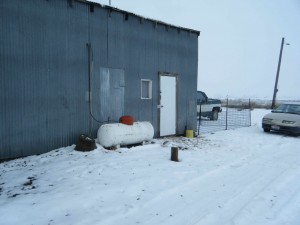
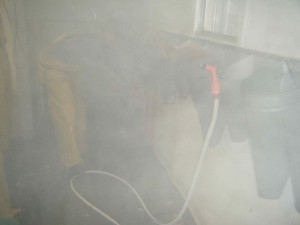
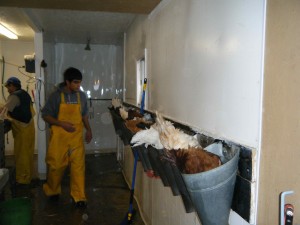
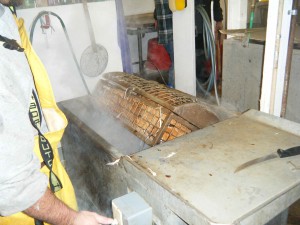
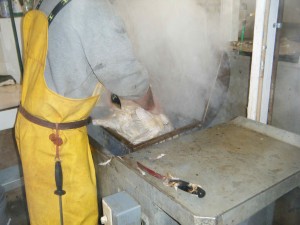
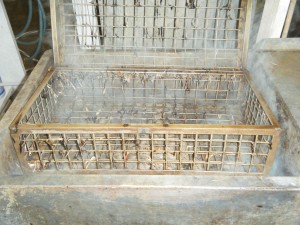
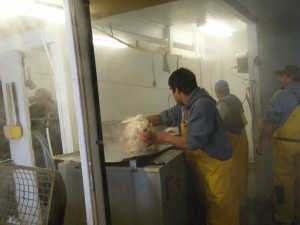
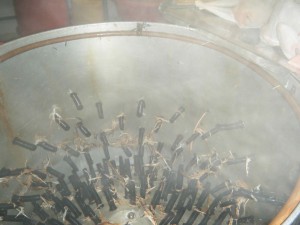
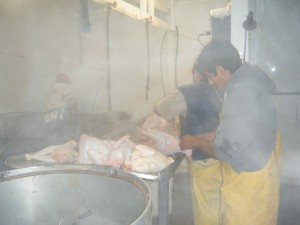
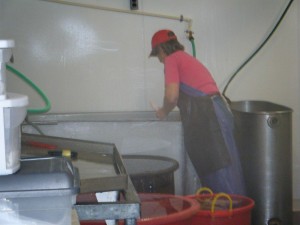
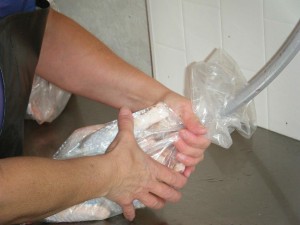
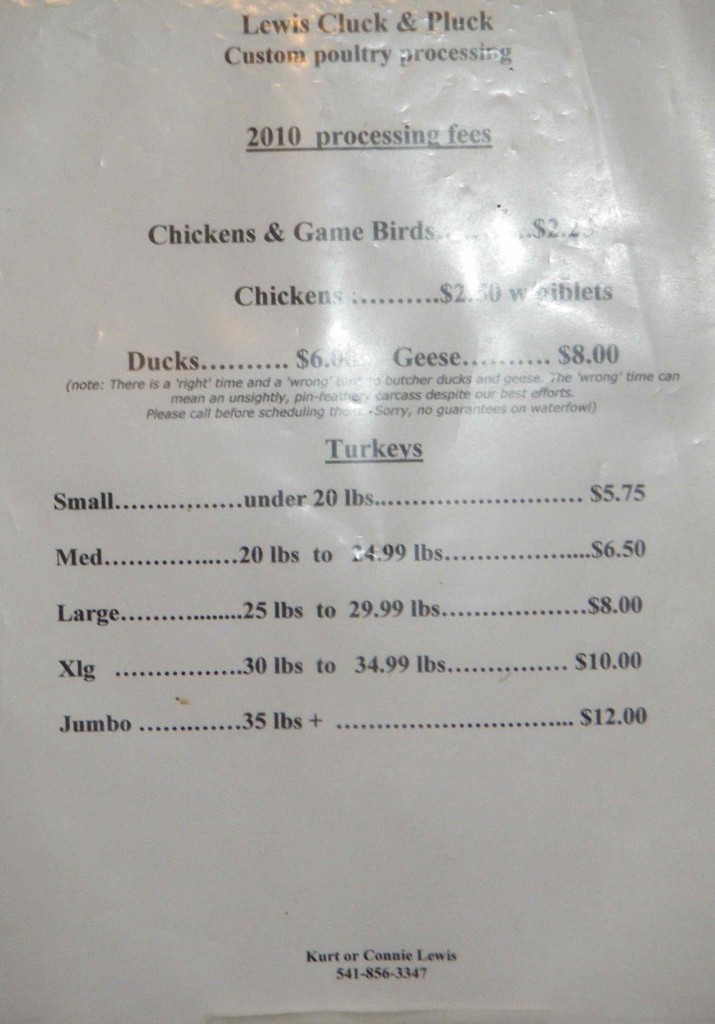
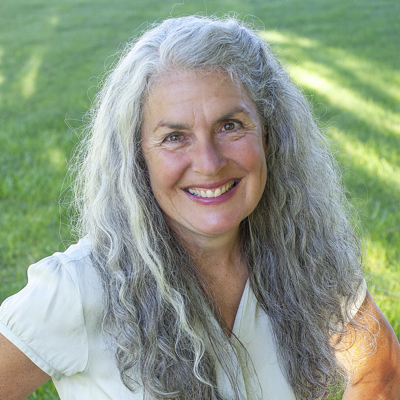
What a nice story about the roosters, Carlie, we’ve only eaten 2 of ours also so far and they were delicious. I’m glad we have Cluck-N-Pluck available. Hopefully the rooster/ hen ratio will tilt the other way this year.
Wow, very interesting. Your writing is very descriptive. 🙂 If I ever have chickens and no time to butcher them, I’ll keep Cluck & Pluck in mind!
Poor roosters 🙂 Well, I’m sure that was the best way to get it all done. Better than home butchering, by far.
Great article about getting your roosters ready for the freezer. I’m getting my ducks done tomorrow at the same place and I have the address. Cluck and Pluck is located at 26380 Ustick Road, Wilder, Idaho 83676. They have a Wilder zip code but they are within walking distance of Homedale. Their prices have gone up. Ducks are now $9 each instead of the $6 in 2010.
Thank you so much for posting that information here. They are a great business!